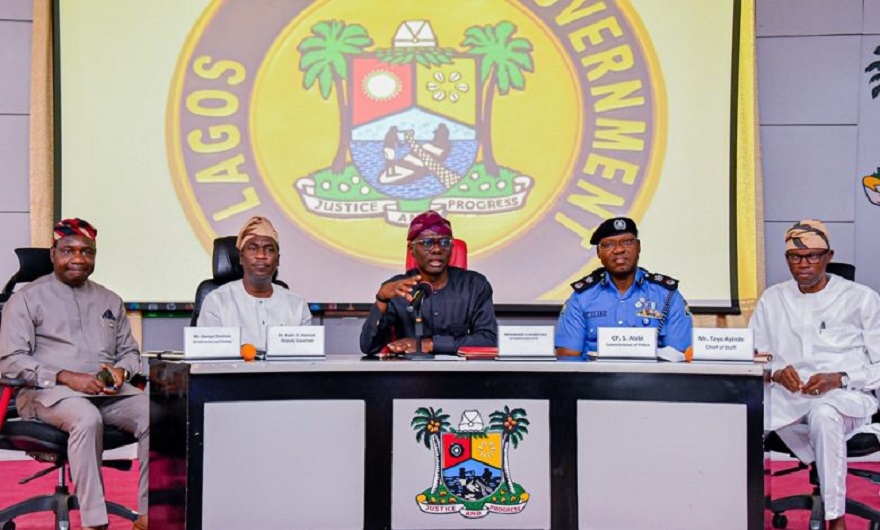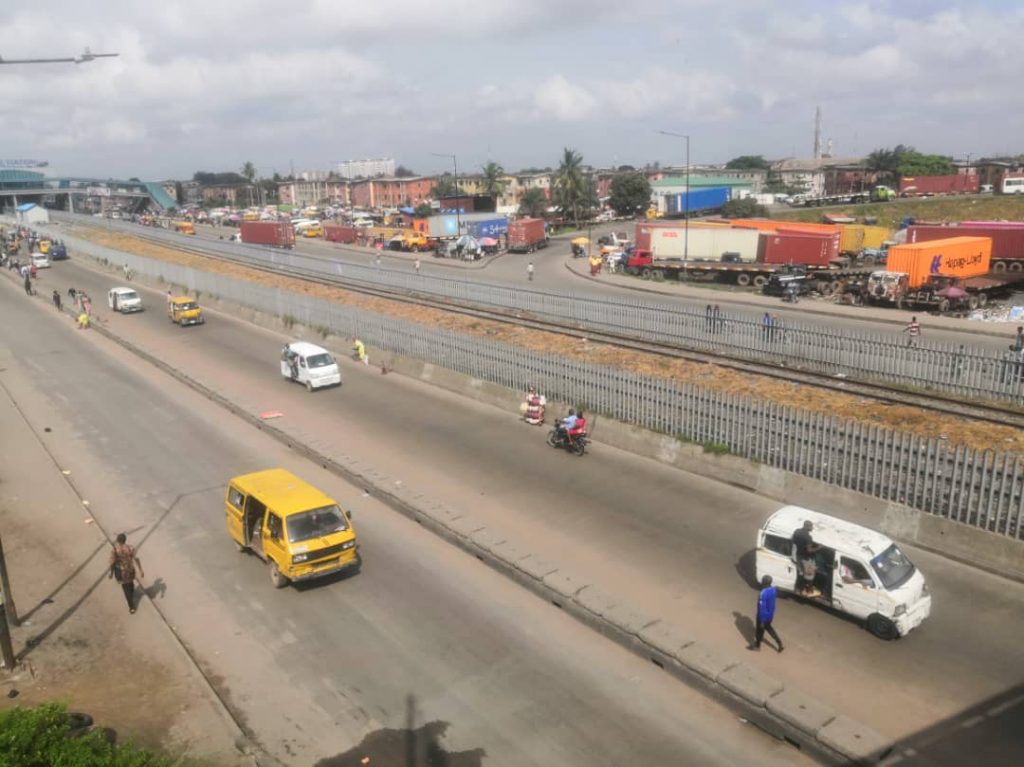Auto
Again, Governor Sanwo-Olu Bans Okada in Lekki, Ikeja, Others

By Aduragbemi Omiyale
The Governor of Lagos State, Mr Babajide Sanwo-Olu, has announced a total ban on operations of commercial motorcycles, popularly known as Okada, in Lekki and other places.
At a meeting on Wednesday, he said the directive will become effective from June 1, 2022, and affects six Local Government Areas (LGAs) and nine Local Council Development Areas (LCDAs) of the state.
According to him, okada riders will not be allowed to ply highways in these areas, which include Eti-Osa, Ikeja, Surulere, Lagos Island, Lagos Mainland, and Apapa.
The action of the governor followed the growing menace and nuisance constituted by commercial motorcycles in the state, including the lynching of a Sound Engineer, Mr David Imoh, in the Lekki area of the state last week.
This is not the first time Mr Sanwo-Olu is restricting operations of commercial motorcycles as in February 2020, he banned Okada operations in the state.
At the meeting with the Commissioner of Police, Area Commanders and Divisional Police Officers (DPOs) at the State House in Alausa today, the Governor said the state government would not condone any security formation that relaxes the new ban in its jurisdiction.
“After critical review of our restriction on Okada activities in the first six Local Government Areas where we restricted them on February 1, 2020, we have seen that the menace has not abated. We are now directing a total ban on Okada activities across the highways and bridges within these six Local Governments and their Local Council Development Areas, effective from June 1, 2022.
“This is a phased ban we are embarking on this period, and we expect that within the short while when this ban will be enforced, Okada riders in other places where their activities are yet to be banned can find something else to do. We have given the notice now and we expect all commercial motorcycles plying the routes in the listed councils and areas to vacate the highways before enforcement begins. The enforcement will be total,” he said.
Mr Sanwo-Olu advised residents patronising Okada riders on highways to embrace the alternative transport schemes already provided by the government to plan their journey.
He said the government had provided last mile buses, medium-capacity and high-capacity buses in the affected areas for the convenience of commuters.
The Governor insisted that Okada riding on the highways remained unsafe and would no longer be tolerated, noting that the state government had been ramping up construction work on its two rail line projects to further increase the choices of commuting for residents.
“We have provided last-mile buses in the affected areas; they are working and effective. We also have medium-capacity buses and high-capacity buses working in these areas. Before the end of the year, we are also bringing the rail along these corridors with their terminals. We have provided jetties as well to provide alternatives.
“We will not sit back and watch criminally-minded people use that mode of transportation (motorcycles) to perpetrate crimes and criminality in Lagos.
“Lives are being lost on a daily basis, preventable accidents are happening every day and the riders are not respecting any of our traffic laws. The situation has led to a complete breakdown of law and order. This ban has come to stay and we will not tolerate any weakness in enforcement,” he said.
The Commissioner of Police, Mr Abiodun Alabi, directed his men to ensure complete enforcement of the Governor’s order in the listed councils and areas.
Auto
Lagos Wants Fewer Cars on Roads to Drive Growth

By Adedapo Adesanya
The Lagos State Government has reiterated its commitment to creating an eco-friendly state with fewer cars on the roads in the future.
The Lagos State Commissioner for Transportation, Mr Oluwaseun Osiyemi, said this during a presentation at the closing of the fifth Lagos Real Estate Marketplace Conference and Exhibitions in Lagos.
Mr Osiyemi said that the commitment is in line with the T.H.E.M.E.S Agenda of Mr Babajide Sanwo-Olu’s led administration, expressing concerns that traffic congestion costs the state trillions of Naira in budget deficits annually.
The transportation commissioner noted that the heavy reliance on road transportation, which accounts for 90 per cent of travel in Lagos, is unacceptable and unsustainable.
The Commissioner stated that water and rail transportation account for only two per cent of the means of transportation, highlighting their gross underutilisation.
Mr Osiyemi emphasised that every sector in the state must be robust enough to contribute significantly to the wellbeing of its residents, as Lagos accounts for 30 per cent of the nation’s gross domestic product.
He expressed the state’s readiness to maximise the use of intermodal transportation system, to help upscale socio-economic activities in the metropolis and reduce man-hour loss to traffic.
In a panel discussion, the Special Adviser to Governor Sanwo-Olu on Climate Change and Circular Economy, Ms Titilayo Oshodi, emphasised the need for the state and its stakeholders to adopt a purposeful approach to waste management.
Ms Oshodi highlighted the importance of a circular economy in recycling, repurposing and reusing waste effectively.
She noted that several policies were already in place in the state for managing waste, urging producers and manufacturers across various sectors to collaborate with the state government to contribute to carbon reduction efforts.
Other panellists including Ms Stella Okengwu, Chief Executive Officer of Winhomes, said that the current economic situation calls for housing to be built based on clear demand that aligns with people’s budgets while Mr John Oamen, Co-founder of Cutstruct, urged the state government to promote the digitisation of construction procurement.
This, he added, would enhance the efficiency and practices of the construction and real estate sectors.
Auto
Heirs to Introduce Low-Cost Motor Insurance

By Modupe Gbadeyanka
There are plans by Heirs Insurance to introduce insurance products tailored for vehicle owners, a statement from the underwriting firm has disclosed.
According to the subsidiary of Heirs Holdings, this low-cost motor insurance package known as the Flexi Comprehensive Motor Insurance Plan will provide the benefit of a comprehensive motor insurance plan for a fraction of the cost, addressing the financial realities many Nigerians face.
The underwriting company announced the plan to introduce this package as it launched a new campaign designed to reward its customers.
This initiative themed Unwrapping Smiles will bring hope to individuals, families, and communities this holiday season, and will run from December 10 to December 31, 2024.
It will feature community-focused outreaches, including Christmas gifts and exciting rewards to put smiles on the faces of Nigerians. It will also include the launch of a holiday-watch web film known as The Underwriters for all Nigerians to enjoy.
“At Heirs Insurance Group, we are committed to providing much more than insurance. In a season when many Nigerians seek hope and reasons to smile, we are proud to offer initiatives that inspire and uplift,” the Chief Marketing Officer of Heirs Insurance, Ms Ifesinachi Okpagu, said.
Auto
FG Claims Investments in Presidential CNG Initiative Now $450m

By Adedapo Adesanya
Nigeria’s Presidential Compressed Natural Gas Initiative (PCNGi) claims that investments in championing the CNG value chain have hit $450 million.
This was disclosed by Mr Michael Oluwagbemi, Project Director and Chief Executive Officer (CEO), PCNGi, during the 9th Edition of the Nigeria Energy Forum (NEF2024) Day 2, Virtual Event themed Energising Sustainable Industrialisation.
According to the PCNGi CEO, the amount goes into things like mother stations, daughter stations and refuelling stations as well as conversion centres which are starting to spring up across the nation.
Mr Oluwagbemi, represented by Mr Tosin Coker, the Head of Commercial, PCNGi, said the initiative had successfully converted more than 10,000 vehicles from petrol to CNG.
“By 2027, the initiative will have converted more than one million vehicles using petrol to CNG,” he said.
On incidents of explosion of vehicles using CNG, the CEO assured Nigerians that it had taken precautionary measures with different agencies of government to ensure safety.
Mrs Ibironke Olubamise, National Coordinator of the GEF Small Grants Programme (SGP), managed by UNDP, said the SGP was investing in youth energy innovation for economic growth and environmental sustainability.
Mr Daniel Adeuyi, NEF Group Chairman, said, “The event featured three super sessions on Energising Industrial Revolution, Community Climate Action by GEF-SGP UNDP and Clean Energy Innovations.
“The sessions are to share lessons learnt from real-life projects and build capacity of young entrepreneurs and cross-industry professionals.”
Mr Joseph Osanipin, the Director General of the National Automotive Design and Development Council (NADDC), said that the council had trained more than 4,000 auto technicians on how to convert petrol vehicles to CNG.
He said the council had started campaigns to sensitise Nigerians on the advantages of using CNG to power their vehicles.
“CNG can guarantee a cleaner environment, it is cheaper and affordable,” he said.
Mr Oluwatobi Ajayi, the Chairman and Managing Director of Nord Automobile Ltd., said the company was established to tackle the growing demand for vehicles in Africa and reduce import dependency.
He said that because of the Federal Government’s CNG initiative, the company had incorporated it into their vehicle production to meet up with the government policy.
Mr Armstrong Tankan, the Managing Director and Chief Executive Officer, Ministry of Finance Incorporated (MOFI), said that MOFI was set up in 1959 as the statutory vehicle to hold all the assets owned by the federal government.
“Today, we’ve been able to identify the assets the federal government owns and we are trying to track them.
‘We actually do have assets, not just locally but globally as well and we must establish visibility over what the federal government owns before we can start talking about managing them.
“So, we want to try to minimise the waste, minimise the overlaps and help to improve output,” he said.
-

 Feature/OPED5 years ago
Feature/OPED5 years agoDavos was Different this year
-
Travel/Tourism8 years ago
Lagos Seals Western Lodge Hotel In Ikorodu
-

 Showbiz2 years ago
Showbiz2 years agoEstranged Lover Releases Videos of Empress Njamah Bathing
-

 Banking6 years ago
Banking6 years agoSort Codes of GTBank Branches in Nigeria
-

 Economy2 years ago
Economy2 years agoSubsidy Removal: CNG at N130 Per Litre Cheaper Than Petrol—IPMAN
-

 Banking2 years ago
Banking2 years agoFirst Bank Announces Planned Downtime
-

 Sports2 years ago
Sports2 years agoHighest Paid Nigerian Footballer – How Much Do Nigerian Footballers Earn
-

 Technology4 years ago
Technology4 years agoHow To Link Your MTN, Airtel, Glo, 9mobile Lines to NIN











